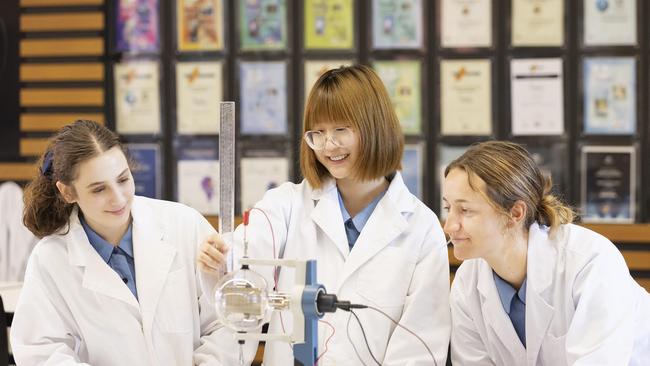Forge Your Future: Teens fast-tracked for AUKUS submarine careers
Over 2000 Australian high schoolers are being engaged in a program to fast-track them into careers assisting to build the nation’s nuclear-powered submarine fleet.

Thousands of Australian high schoolers are being engaged in a program to fast-track them into careers assisting to build the nation’s nuclear-powered submarine fleet.
Around 2500 high schoolers in South Australia are expected over the next year to enrol in the government-backed initiative, designed to employ young Australians with the “tools, connections, education and industry experience” to get them into careers in defence industry companies.
The program, supported by Babcock and BAE Systems, and delivered by Australian-founded tech companies WithYouWithMe and Year 13, has engaged more than 1300 schools nationally, and hopes to help Australia meet its goal for 20,000 highly skilled workers to support its AUKUS ambitions over the coming years.
WithYouWithMe chief executive Tom Larter, whose Australian-founded tech company along with Year 13 is behind the program, said it would help to “remove the guesswork” for students hoping to be connected with career opportunities.
“At a national level, it helps school students in their final years understand how they cognitively match to the skills available in these various jobs ... We expect to reach over six million people with this awareness campaign, including really key stakeholders and influences in and around students,” he said.
“Within SA specifically, we (want to) work to improve the transition of students into careers supporting naval shipbuilding as a main strategic priority. In that sense we partnered with a number of industry providers like Babcock and BAE” who provide industry-based mentoring and virtual events.
Australia will begin building its first SSN-AUKUS in Osborne in SA by the end of this decade. It is expected to be delivered in the early 2040s.
“The defence industry is rich with career opportunities but pathways into the sector are confusing for young people to navigate,” Mr Larter said.
Students complete AI-driven career matching to discover their “natural strengths” in the sector, such as engineering, trades, digital and IT, before gaining access to up to 15 hours of personalised, non-linear content.
It is comprised of virtual and in-person activities including in-school events, online engagement, learning and development for job-readiness, interactive e-learning modules, mentorship with industry professionals, connections with defence primes, virtual work experience, and career events with defence industry employers.
Schools can sign up and incorporate the program, known as Forge Your Future, as a curricular activity, or students can participate at their own pace.
“By aligning their skills and interests with pathways in shipbuilding and advanced technologies, we’re helping them discover careers that can both support them and their country in the years ahead,” Year 13 co-founder Will Stubley said.
“Through this initiative, we’re ensuring young people leave school today informed and ready to take on our nation’s greatest projects and challenges.”
Research compiled as part of the program showed more than a quarter of young people were interested in STEM or a trade career in SA, and 16 per cent would consider relocating to SA to engage in this sort of career; 29 per cent said they had a lack of awareness of STEM defence industry career paths, a “key obstacle” to pursuing work in the sector.






To join the conversation, please log in. Don't have an account? Register
Join the conversation, you are commenting as Logout